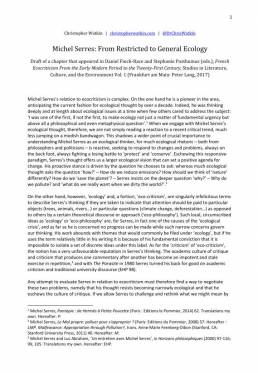Description
The growing field of neuro-philosophy throws up important issues for our society about how we understand the persistence of personal identity over time: If my brain is damaged or otherwise altered, do I become a different person? This chapter explores some of the work of the French neuro-philosopher Catherine Malabou as she asks, and tries to answer, this fundamental question about who we think we are, giving a non-reductive materialist account of self-identity. Malabou’s engagement with the cognitive approach to identity is mediated by neuroscientist Antonio Damasio’s discussions of Phineas Gage, the nineteenth century Vermont railway worker whose frontal lobe was damaged when an explosion sent a tamping iron through his skull. The neuroscientific interest of the case is not in Gage’s unlikely survival but in the indication it provides—or so it is argued—that there is a causal relation between lesions in particular areas of the brain and specific personality changes. Quoting the account of the case written by Gage’s surgeon John Harlow, Malabou insists that “Gage was no longer Gage”, and that the radical nature of the transformation brought about by brain lesion made him a new person. For too long, she argues, we have maintained in the Western tradition that, however form may change, substance remains the same, and the Gage case shows that there is no underlying substrate of identity that persists through the trauma. In addition to her discussion of the Gage case, Malabou poignantly discusses her own experience of the onset and progress of Alzheimer’s disease in her grandmother, a process which she describes as a “depersonalisation” that rendered her grandmother an “other person”. Malabou brings her sophisticated concept of plasticity to bear on the question of identity, offering an alternative to the perennial philosophical duo of substance and attribute and exploring the implications of situating personhood (rather than just personality) in the brain. Despite the nuances which her notion of plasticity introduces, however, Malabou’s account of personal identity remains problematic. In this chapter I offer a critique of her position that beings by drawing attention to an irony in the way that the Gage case is commonly interpreted: the claim being made is that identity and personhood are adequately understood through and in terms of the brain, and yet the very judgement which seeks to ground that position – exemplified in Harlow’s claim that “Gage was no longer Gage” – is a third party judgement, an identity conferred within a community of discourse and medical expertise, in a way that at least prima facie invalidates the position that personhood is cerebral. Gage himself, as it happens, thought he was still Gage. I argue that Malabou has implicit within her writing the seeds of a more adequate account which would not understand identity and personhood to be immanent to the material brain but would embrace a broader notion of identity distributed across relationships, institutions and shared common narratives.
Only logged in customers who have purchased this product may leave a review.


Reviews
There are no reviews yet.